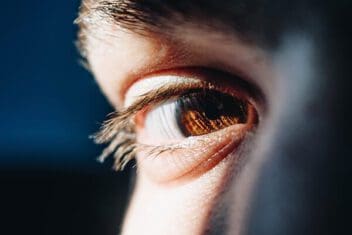Mental Health Effects of Vision Issues
Home / Vision Education /
Last Updated:
Poor vision can negatively impact both our physical well-being and mental health. In turn, many psychiatric conditions and medications can increase the odds of vision-related issues.
Table of Contents
Blindness can be even more impactful, leading to severe depression, PTSD, and phobias. Treatments, including corrective lenses, medications, and eye surgeries, can improve vision issues and mental health concerns simultaneously. Cataract and LASIK surgeries can enhance your physical and mental state and overall quality of life.
More than 2 billion people in the world have either distance or near vision impairment. But worsening vision impairment and blindness are often treatable conditions.
How Common Are Eye Issues?
Eyesight is something we expect to just always be there, and it plays a big role in our overall quality of life. As we age, it can often deteriorate. This can bring a multitude of other issues with it as well, including mental health concerns. While vision loss can impact people of every age, it is most common in adults over the age of 50.
The Centers for Disease Control and Prevention (CDC) reports the following on common eye issues:

- In the United States, approximately 12 million people over the age of 40 have vision impairment.
- About 1 million people are blind.
- Nearly 7 percent of children under the age of 18 are diagnosed with a vision or eye condition.
- As of 2012, over 4 million Americans ages 40 and above had uncorrectable vision impairment. This number is expected to more than double by 2050, as chronic health conditions impacting vision are on the rise in the older adult population.
- For adults, vision disabilities are one of the top 10 disabilities in the United States.
Poor eyesight is common. Many conditions causing poor eye sight are treatable and even preventable with regular and routine eye care.
Poor Vision Can Have an Impact on Your Mental Health
Struggling to see clearly can make everyday life harder. Reading, watching TV, recognizing faces, and daily life tasks can all be more difficult with poor vision. These difficulties can lead to depression, anxiety, and social withdrawal.
Depression
Vision loss can double your risk for struggling with depression. When it is hard to see and complete everyday life tasks as expected, it’s common to get frustrated, upset, disoriented, and sad.
Less than 20 percent of people who are visually impaired are offered the necessary emotional support for their condition. As a result, elevated stress and depression are common.
In turn, depression can also increase the odds for worsening vision impairment and vision loss, as people who are depressed are less likely to seek medical care for physical health conditions, many of which can impact vision. They are also less inclined to modify their lifestyle to stall the progression of vision issues. Healthy lifestyle choices that can do so include quitting smoking, exercising regularly, and limiting alcohol consumption.
Anxiety
Vision loss can increase the risk for anxiety, loneliness, and unintentional injuries. It can be easy to panic about not being able to do the things you are used to being able to do.
Poor vision can make it harder to recognize faces, order at a restaurant, drive, and do other everyday things. This can lead to panic about going out or even daily life tasks.
Stress is a known risk factor and contributing cause for vision issues.Stress can impact chemicals in the body that can create a dysregulation in the vascular and sympathetic nervous system, which negatively impacts the eyes and are thought to play a part in several eye diseases such as glaucoma.
Social withdrawal
Vision issues can make it harder to get around. They limit your ability to get yourself places by driving. They can make you less likely to want to leave your house due to feelings of anxiety, depression, embarrassment, and inadequacy. In this way, vision loss and impairment can also lead to social isolation and withdrawal.
Medications
Vision issues can be caused or compounded by treatment for anxiety and depression disorders. Many of the prescribed medications can cause mydriasis (dilation of the pupil), blurred vision, difficulties with color perception, and a higher risk for diabetes, which can lead to vision issues and loss.
Tricyclic antidepressants, antipsychotic medications, and SSRIs (selective serotonin reuptake inhibitors), which are prescribed to treat mental health and psychiatric conditions, can all unintentionally negatively impact vision. This can lead to additional mental health concerns.
Blindness Can Make Issues Worse

It has a direct impact on daily life and quality of life. Vision impairment and blindness can make it hard to attend to daily life tasks, including cooking, cleaning, driving, reading, watching TV, taking medications, and even being able to know who is in the room with you.
Blindness can therefore lead to worsening mental health issues, including severe depression, phobias, and PTSD (post-traumatic stress disorder).
Ommetaphobia is an extreme fear of the eyes and is a common phobia. Fear of becoming blind is also common, and it is more common among people who are experiencing vision issues already. This can increase anxiety and stress levels, which can actually elevate the risk and progression of vision loss.
PTSD develops after a person experiences a particularly traumatizing event, typically one that was life-threatening either to the person directly or something they witnessed. Vision loss is not generally considered a traumatic event; however, it can be caused by trauma. Research finds that between 4 percent and 50 percent of people who are visually impaired also have PTSD. Research finds that between 4 percent and 50 percent of people who are visually impaired also have PTSD.
Treatment for Vision Impairment
Many causes of vision loss are preventable and treatable. The progression of eye disorders and conditions can be reduced and managed with proper and regular eye care. The best way to improve your eye health, and therefore your mental health, is to get regular eye exams and routine eye care from a trained professional.
Vision impairment is often related to medical health conditions, such as diabetes, and treating the condition can help to preserve your eyesight. Vision issues can be treated through:
- Preventative and regular eye and medical health care.
- Corrective lenses, such as eyeglasses or contacts.
- Medications for medical and/or mental health conditions.
- Surgeries like cataract and refractive error corrections.
Positive Effects of Cataracts & LASIK Surgeries

Cataracts are a common age-related condition that can lead to a cloudy area on the lens of your eye, which therefore impacts vision. Cataracts can lead to blurry vision, decreased night vision, trouble with color vision, and halos around lights.around lights.
Cataracts can impact your daily life, making it hard to see well. They also raise the risk for mental health issues.
Cataracts are completely treatable through a safe and effective surgery that can clear up vision issues related to the cataract. The surgery is quick, and it has a 90 percent success rate for improving vision. Cataract surgery removes the cloudy lens and replaces it with an artificial lens, an IOL (intraocular lens).
LASIK (laser-assisted in situ keratomileusis) is a surgery performed to correct refractive errors such as farsightedness, nearsightedness, and astigmatism.. LASIK surgery can improve your eyesight by reshaping the cornea, and it often means that you will no longer need to wear contacts or prescription eyeglasses. Eliminating the need for corrective lenses can enhance your self-esteem and therefore positively impact your mental health.
LASIK is also a quick, effective, and safe procedure with a short recovery time. It can bring lasting physical and mental health benefits.
Resources for People Dealing With Mental Health Issues
As many as one out of five adults in the United States experienced a mental illness in 2019; this is over 50 million people. Mental illness and struggles with mental health are common. There are many resources available to support individuals and families.
- NAMI Helpline: The hotline is staffed from 10 a.m. to 8 p.m. Monday through Friday (EST). There is also a 24/7 crisis text line and chat option for resources and immediate support.
- SAMHSA’s National Helpline: SAMHSA provides 24/7 confidential and free support, acting as a referral and information service for individuals and families with mental health concerns.
- MentalHealth.gov: This resource provides information to help families and individuals get help and mental health support.
- National Institute of Mental Health (NIMH): NIMH offers a National Suicide Prevention Lifeline, a Crisis Text Line, Veterans Crisis Line, and information on finding a health care provider or treatment program.
Your local health department and primary care provider can also give you information on treatment programs and providers in your area to support and help manage mental health concerns.
References
- Blindness and Vision Impairment. (February 2021). World Health Organization (WHO).
- Fast Facts of Common Eye Disorders. (June 2020). Centers for Disease Control and Prevention (CDC).
- The Hidden Connection Between Vision Loss and Mental Health. (May 2014). Medical Xpress.
- ‘Blindness and Mental Health Can Come Hand in Hand.’ (March 2019). BBC News.
- Visual Impairment and Mental Health: Unmet Needs and Treatment Options. (December 2020). Clinical Ophthalmology.
- Mental Stress as a Consequence and Cause of Vision Loss: The Dawn of Psychosomatic Ophthalmology for Preventive and Personalized Medicine. (June 2018). EPMA Journal.
- Vision Loss and Mental Health: The Hidden Connection. (2021). Social Work Today.
- The Burden of Vision Loss. (June 2020). Centers for Disease Control and Prevention (CDC).
- The Development of Posttraumatic Stress Disorder In Individuals with Vision Impairment: a Systematic Search and Review. (January 2021). Ophthalmic & Physiological Optics.
- Cataracts. (August 2019). National Eye Institute (NEI).
- Surgery for Refractive Errors. (June 2019). National Eye Institute (NEI).
- Mental Health by the Numbers. (March 2021). National Alliance on Mental Illness (NAMI).
- NAMI Helpline. National Alliance on Mental Illness (NAMI).
- National Helpline. (May 2021). Substance Abuse and Mental Health Services Administration (SAMHSA).
- MentalHealth.gov. U.S. Department of Health and Human Services (HHS).
- Help for Mental Illnesses. (August 2019). National Institute of Mental Health (NIMH).
This content is for informational purposes only. It may have been reviewed by a licensed physician, but is not intended to serve as a substitute for professional medical advice. Always consult a your healthcare provider with any health concerns. For more, read our Privacy Policy and Editorial Policy.